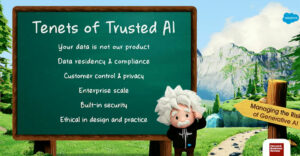
The emergence of the social customer is forcing businesses to think differently about how they reach the people to whom they sell, and much has been written about ways for businesses to cope with this. However, as is all too common in CRM discussions, the customer is often forgotten as we default to dwelling on processes and software that are decidedly business-centric in their nature.
The customer is facing a dramatically changing landscape, too. To use a hockey metaphor, you want to pass the puck to where the other player will be — not where his is now. Similarly, business has to appreciate the social media issues customers are wrestling with and how they’re addressing them if they want to develop approaches that will work for the long term.
One of those issues is the idea of trust. The sources of information trusted by customers have changed dramatically over the past few years. That makes sense, because the access to different sources of information has expanded dramatically during this time frame.
Losing Faith in Peers?
The Edelman Trust Barometer over the years has charted the growth in trust in one particularly interesting category: something described as “person like yourself.” That’s a category that has gone from being rather finite — limited to people customers knew personally — to exceptionally broad as the social media revolution has unfolded.
Starting in 2006, the percentage of people who said that “person(s) like yourself” were “extremely credible” or “very credible” has climbed, especially in relation to other sources of information — as high as 47 percent in 2009.
Something has happened in the last few years, if the 2011 numbers are to be believed. That percentage dropped to 43 percent — a small slide from past levels — while people expressing the same degree of trust in CEOs went from 31 percent in 2009 to 50 percent in 2011.
Enter the Tricksters
What accounts for that change? I think it reflects a growing sophistication on the part of customers about “people like yourself” whom they don’t know personally, or know casually through social media. As social media goes from a magical new channel for communication to something that’s better understood, customers are starting to apply the same filters to their views of their fellow social media users that they have applied to other sources of information.
There’s good reason to do this, too. Unless you go back to the earlier, face-to-face version of “a person like me,” you have to trust other social media users to be sincere. Sadly, that’s not always the case. I’ve heard of companies giving away merchandise in exchange for positive “reviews” on retail sites because that drives better placement on search engines.
We’ve seen bloggers demonstrating somewhat iffy ethics in a few cases in exchange for payments or “sample” items. And, certainly, most corporate discussions of social media are focused not on how to use these channels to build real relationships but on how to drive revenue through them. No wonder the customer is starting to look at their social media interactions with an increasingly jaundiced eye.
Still the Best Policy
If people are becoming wary of other individuals on social media, what does this level of skepticism mean for businesses? It should drive home the idea of authenticity — that your business acts as a peer with your customers, that you speak honestly, and that you maintain a real two-way conversation. These are parts of the relationship that social media enables businesses to build, as it has allowed customers to build relationships between each other.
If you build those relationships and don’t abuse social media channels, then your customers have no need for skepticism toward you. Furthermore, as customer attitudes continue to harden — and they will, especially as businesses inevitably misuse social media — the relationships you build today will help enhance your reputation tomorrow and help buffer you from being carried along with the larger tide of skepticism.
CRM Buyer columnist Chris Bucholtz blogs about CRM at Forecasting Clouds. He has been a technology journalist for 15 years and has immersed himself in the world of CRM since 2006. When he’s not wearing his business and technology geek hat, he’s wearing his airplane geek hat; he’s written two books on World War II aviation, and his next two are slated for publication in 2010.





















































Thank you so much for sharing this story with us. I agree with you 100%! There are to many businesses that forget what to do once they have a new client, or how to provide the service they deserve. If businesses put in half the effort into their customer care that they do with their sales and marketing, you would have one satisfied customer!
Great comments on the social media side of things as well. Social media isn’t a platform for hard sales, its a place of engagement, and education. So many companies forget that this isn’t your "Used Car" sales lot to use 140 characters to get your message out there. You have to be transparent, ethical and honest on all levels about your company in the social media world if you want to build your brand in a positive manner!
Jennifer D Hashisaki
http://www.karmacrm.com/